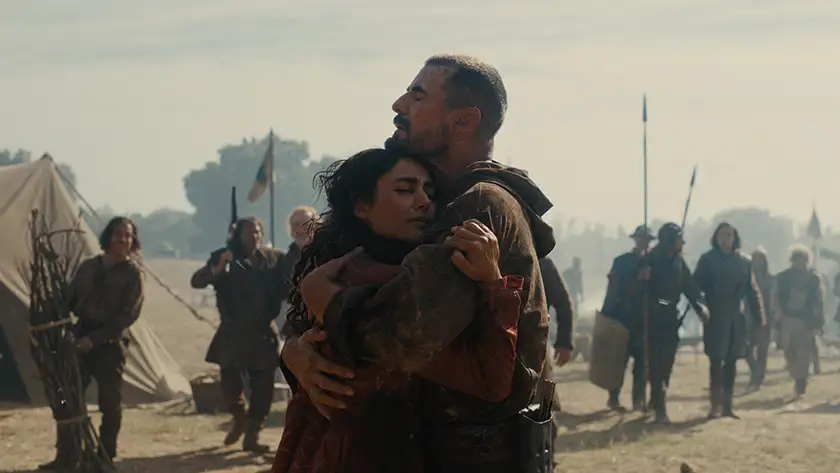Nick Hamm’s William Tell aims high with thunderous battles, a talented ensemble, and stunning vistas, even if it borrows a few too many moves from better epics.
Director: Nick Hamm
Genre: Action, Biographical, War, Drama
Run Time: 133′
Rated: R
U.S. Release: April 4, 2025
U.K. Release: January 17, 2025
Where to Watch: In theaters (US & Canada); On Digital & VOD (U.K & Ireland and more countries)
For a man whose most famous act involves shooting an apple off his son’s head, legendary Swiss folk hero William Tell has been surprisingly underserved in cinema. Of course, you’ve likely heard the familiar music that bears his name before; Rossini’s “William Tell Overture” has been forever ingrained in pop culture through its use in the theme of The Lone Ranger and a bounty of commercials for insurance companies. For me, it will always be linked to a pair of cartoon titans: Mickey Mouse in his first color short, 1935’s The Band Concert, and Bugs Bunny in the 1948 classic Bugs Bunny Rides Again.
The galloping rhythm of the high-octane composition tells an exciting story and quickens the pulse, and much of director Nick Hamm’s ambitious take on Switzerland’s most iconic rebel follows suit.
Based on Friedrich Schiller’s play written in 1804, William Tell excavates a rich historical context for both those familiar with this era of history and the uninitiated, transforming a simple legend that has become a cultural touchstone for generations into a complex narrative of resistance against oppression. The story unfolds in Switzerland circa 1307 under the oppressive rule of the Austrian Habsburgs. The cruel leaders (including Ben Kingsley, Gandhi) rule by fear, pushing their mistreated population to the brink of rebellion. Certain nobles, such as Rudenz (Jonah Hauer-King, The Little Mermaid) and Werner Stauffacher (Rafe Spall, The Big Short), “bend the knee,” staying on good terms with their oppressors to retain what power they have (sound familiar?) while others are already at the breaking point.
Claes Bang (The Northman) plays Tell, a war-weary ex-Crusader haunted by his past who only wants to raise his son Walter (Tobias Jowett) in peace with his wife Suna (Golshifteh Farahani, Hood Witch). But peace is short-lived with the arrival of Gessler, played with poisonous malevolence by Connor Swindells (Sex Education), who commands peasants to bow to a hat on a pole—and punishes those who don’t. This refusal to follow the mandate of obeisance that sparks Tell’s rebellion is as much about personal dignity as noble defiance and from there the film charges into a full-blown revolution that, as the story goes, changed the course of history.

I was sorry to miss this during its premiere last fall at the Toronto International Film Festival because William Tell is a noble attempt at the kind of epic filmmaking we don’t see often enough. There’s a grandeur to the camerawork that thrives in its sheer scope: sweeping mountain vistas surrounded by lush green fields, mist-laced valleys with snow-capped Alps in the distance, and vicious battle sequences that don’t pull punches in portraying the brutality of 14th-century warfare. However, there is also a certain amount of déjà vu at every turn in the road. Hamm’s film often reminds you of the best parts of better films, as if the writer/director had run Braveheart, Rob Roy, The Last of the Mohicans, and Robin Hood: Prince of Thieves through a medieval Xerox machine. The emotional heights are stirring but the narrative rhythm settles into a well-worn cadence of battle, speech, loss, repeat.
Bang delivers an accomplished performance as Tell, bringing a weary, heroic strength to the role. In Bang’s hands, Tell is no swaggering savior, but a man previously shaped by violence and haunted by his past conflicts. Initially unwilling to engage in actions that lead to carnage, he’s driven by his unbreakable moral compass that guides him through a series of impossible choices. Ultimately, not taking action is worse than picking up a weapon. In Bang’s interpretation, Tell’s resistance to confrontation gives his journey significant weight, especially as the uprising pulls in an increasingly dense cast of characters. In stark contrast, as the wicked bailiff Gessler, Swindells is entitled and sadistic, a perfectly hissable villain. The dynamic between Tell and Gessler provides the film’s arc and dramatic spine, a chess match of will and wit that takes no prisoners.
The capable supporting cast adds remarkable depth to the narrative, with Farahani’s Suna avoiding the usual “long-suffering wife” trap and emerging as a fully realized partner to Tell. Emily Beecham (Little Joe) and Ellie Bamber (Nocturnal Animals) offer strong counterpoints as noblewomen who get their hands dirty in the fight. As much as some of the males in the film tend to blend into the same filthy, bearded man after a while, these actresses playing two very different heroines on the same side of the rebellion always stood out. Jonathan Pryce (Pirates of the Caribbean) and Kingsley even pop in for prestige-laden cameos, but they’re gone before you know it.
The cinematography by Jamie D. Ramsay (Living) transforms Switzerland’s landscape into a character itself, impossibly beautiful but darkly threatening all the same. William Tell practically begs for an IMAX screen, all the better to catch Ramsay’s precise visuals that extend scenes beyond mere historical recreation. Disappointingly, the production design by Tonino Zera resembles the aftermath of a Renaissance Fair the morning after a mead tasting. Town facades appear borrowed from former souvenir stands, and no amount of Ramsay’s lighting can disguise the fact that a significant portion of the sets feels staged rather than authentically lived-in. Although Rossini is nowhere to be found in the score, composer Steven Price (Gravity) still leans into high drama, infusing battle scenes with thunderous energy and smoothing over some of the script’s more familiar beats.
Hamm’s direction and adaptation of Schiller’s play show an obvious reverence for the source material. Having previously directed the family-friendly Gigi & Nate, his classical stage roots are more apparent in how characters deliver monologues with conviction and period-authentic dialects that might make modern ears perk up. There’s a stateliness to the screenplay that serves William Tell well in its quieter moments but sporadically clashes with the grittier aesthetic of the battle scenes. And while the fights are thrillingly staged and the emotions surrounding them are always sincere, the repetition of beats (hero suffers a loss, rallies troops, cue next assault) starts to wear thin by the third act.
Yet, for all its familiar beats and modest shortcomings, William Tell resonates, especially with those who cherish epic dramas. I didn’t know the depth of Tell’s story before, and now he’ll never be a mere footnote in music history again. Offering a compelling, if somewhat derivative, exploration of a pivotal moment in Swiss history, it may not reinvent the wheel of historical storytelling, but it spins it with gusto. There’s a sincerity in the delivery and a timely cultural relevance that makes Hamm’s film resonate even more now. Resistance to tyranny and refusal to accept humiliation disguised as obedience feel urgent in a way that goes further than when the film was set. And more often than not, the message hits its target.
William Tell: Movie Plot & Recap
Synopsis:
In 1307 Switzerland, William Tell, a former Crusader, becomes an unlikely leader in the rebellion against oppressive Habsburg rulers, fighting for his family and community’s liberation.
Pros:
- Powerful lead performances by Claes Bang and Connor Swindells
- Stunning cinematography captures Switzerland’s landscape
- Intriguing exploration of resistance and personal sacrifice
Cons:
- Occasionally formulaic narrative structure
- Uneven production design
- Missed opportunities for deeper historical context
William Tell will be released in US theatres on April 4, 2025. The movie is now available to watch on digital and on demand in the U.K. & Ireland and more countries.
Loud and Clear Reviews has an affiliate partnership with Apple, so we receive a share of the revenue from your purchase or streaming of the films when you click on some of the links on this page. This won’t affect how much you pay for them and helps us keep the site free for everyone.

